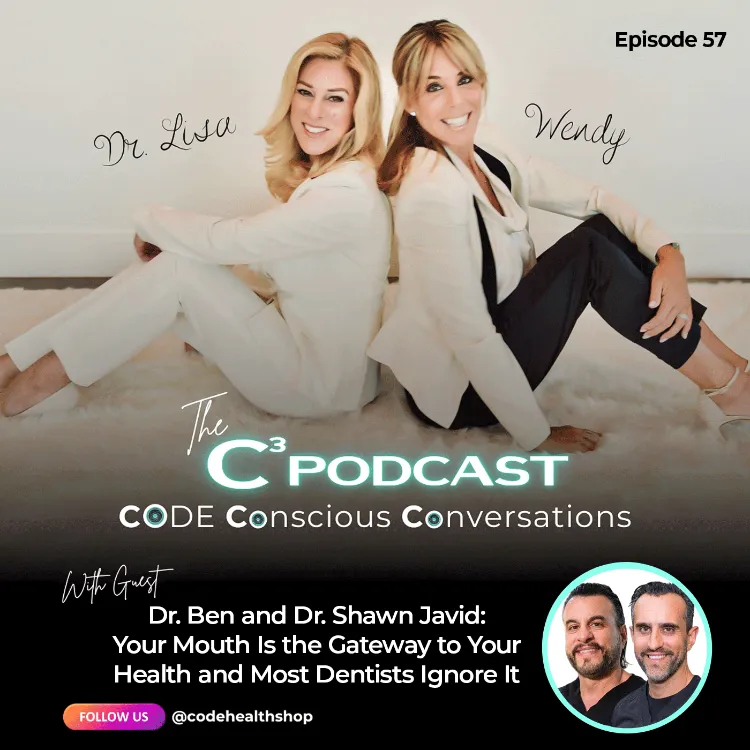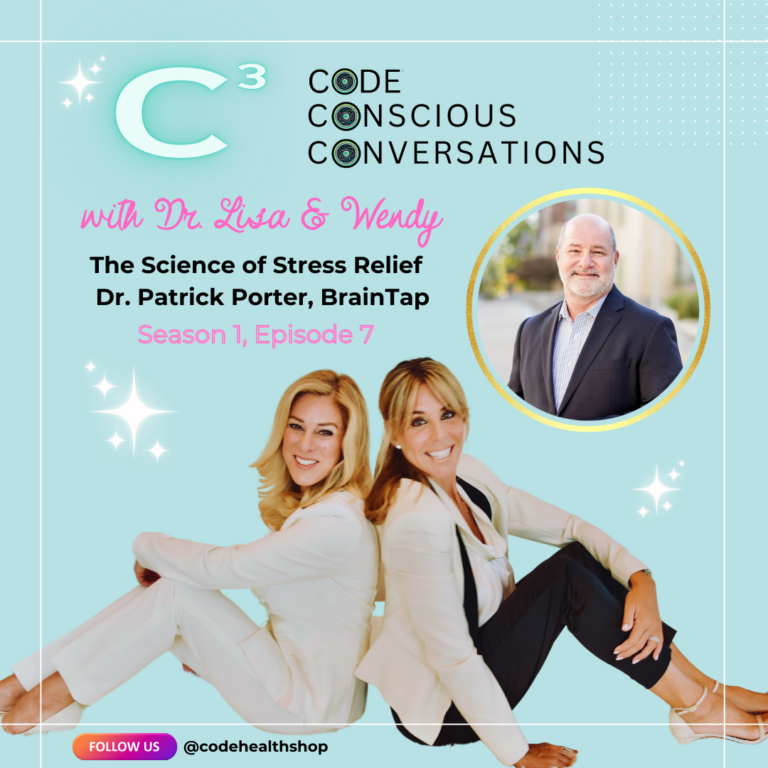It often starts quietly. You wake up with jaw tension that lingers through the day. Your gums bleed more than they used to when you floss. Your energy dips in the afternoon, even though your bloodwork says everything is fine.
Most people shrug these things off or treat them as unrelated. But in biological dentistry, they’re seen as early indicators that your body is under stress, sometimes years before a diagnosis would show up in a medical chart. The mouth, in many ways, is the body’s first warning system.
That’s the perspective Dr. Ben and Dr. Shawn Javid brings to their work.
With decades of combined experience, they’ve studied how subtle changes in oral health can reveal systemic issues like cardiovascular strain, hormone imbalances, and even the beginnings of chronic disease.
In the latest episode of C3 conversation, they share how biological dentistry uses science-backed, prevention-focused care to address root causes, not just symptoms.
Listen to this podcast now at C3 Podcast or join us on Apple Podcasts or Spotify.
What Is Biological Dentistry?
Biological dentistry begins with the understanding that the mouth is not an isolated system. It is intricately connected to the rest of the body through neural pathways, blood vessels, lymphatic drainage, and energetic meridians. Every tooth, gum pocket, salivary gland, and jaw muscle interacts with—and can influence—the health of other organs and systems.
Where conventional dentistry often focuses on resolving local problems, such as filling a cavity or performing a root canal, biological dentistry asks deeper questions: What underlying imbalance allowed this to happen? How will the proposed treatment affect the body’s chemistry, immune function, and long-term health?
This whole-body approach includes:
- Using biocompatible dental materials that integrate safely with human tissue and do not release toxins that could disrupt endocrine function, trigger immune reactions, or accumulate in vital organs. Examples include ceramic implants instead of metal and composite fillings free from BPA and mercury.
- Evaluating the impact of dental procedures on the oral microbiome—the diverse community of bacteria, fungi, and viruses that help regulate oral pH, protect against pathogens, and influence gut health. Disruption to this ecosystem can contribute to systemic inflammation, leaky gut, and immune dysregulation.
- Identifying early warning signs of systemic disease during routine dental exams, such as gum recession linked to osteoporosis, enamel erosion from acid reflux, or tongue coating changes associated with digestive or liver issues. These signs can often appear years before conventional lab results detect abnormalities.
By merging advanced diagnostics with a deep understanding of the mouth–body connection, biological dentistry transforms dental care into a powerful tool for disease prevention and whole-body wellness.
5 Shocking Mouth–Body Connections
- Your gums can reveal disease risk years before symptoms show up
Gum inflammation, or periodontal disease, is one of the most common yet overlooked predictors of systemic illness. The inflamed gum tissue releases pro-inflammatory cytokines such as IL-6 and TNF-α into the bloodstream.
These compounds contribute to the development of atherosclerotic plaques, which increase cardiovascular disease risk. Studies have also linked chronic periodontal inflammation to elevated C-reactive protein (CRP) levels, a biomarker for systemic inflammation. In the brain, persistent low-grade inflammation may accelerate neurodegenerative processes, contributing to conditions such as Alzheimer’s disease.
- Some “routine” dental work can harm your health
Traditional dental practices sometimes use materials that are not biocompatible with human tissue. Amalgam fillings, for example, may release mercury vapor, which can accumulate in organs and disrupt neurological and immune function.
Certain root canal sealants can contain formaldehyde-releasing agents, which may trigger chronic inflammation or immune dysregulation. Biological dentistry prioritizes materials tested for compatibility with your immune system, reducing the risk of endocrine disruption and toxic load.
- Every tooth is connected to an organ or system
According to both neuroanatomy and traditional Chinese medicine’s meridian theory, each tooth has neural pathways and energetic connections to specific organs. For instance, upper molars often correspond to the stomach and pancreas meridians, while lower incisors are associated with kidney and bladder function.
An unresolved infection in a tooth’s periodontal ligament can serve as a “silent” focal infection, continually releasing bacterial toxins (endotoxins) into circulation, which may impair the linked organ’s function over time.
- Jaw alignment affects far more than your bite
Malocclusion and temporomandibular joint (TMJ) dysfunction can influence posture through the trigeminal nerve’s effect on cervical spine muscle tone. Poor alignment can restrict the airway, reducing oxygen saturation during sleep and contributing to sleep-disordered breathing or obstructive sleep apnea.
Chronic airway restriction increases cortisol output, disrupts sleep cycles, and can impair cardiovascular health over the long term. Proper jaw alignment supports optimal breathing mechanics, spinal alignment, and neuromuscular balance.
- Your oral microbiome talks to your gut
The oral cavity is home to over 700 species of microorganisms that continuously interact with the gastrointestinal tract through saliva and swallowing. When the oral microbiome becomes dysbiotic, often from poor diet, antibiotic overuse, or certain dental procedures, it can seed pathogenic bacteria such as Porphyromonas gingivalis into the gut.
This can disrupt gut barrier integrity, trigger systemic inflammation, and contribute to metabolic and autoimmune conditions. Maintaining a balanced oral microbiome supports not only dental health but also digestion, hormone balance, and immune resilience.
Why This Matters for Prevention
Conventional dentistry often operates reactively: a patient presents with pain, bleeding gums, or a fractured tooth, and treatment focuses on resolving the immediate problem. While this approach can address acute issues, it rarely investigates the underlying cause or its connection to systemic health.
Biological dentistry takes a proactive stance. By using diagnostic tools such as salivary pH testing, oral microbiome analysis, cone-beam CT scans, and comprehensive gum health assessments, practitioners can detect subtle changes that signal inflammation, infection, or mineral imbalance long before symptoms become severe.
This early detection is crucial because the mouth serves as both a mirror and a gateway to overall health. Pathogenic bacteria, chronic low-grade inflammation, and structural imbalances in the jaw can influence cardiovascular health, metabolic function, immune regulation, and even hormonal balance.
When your dentist approaches care with whole-body health in mind, routine visits transform into strategic check-ins that can flag early signs of disease, guide preventive interventions, and ultimately protect not just your smile but your long-term vitality.
Learn More in The Latest C3’s Episode
In the latest episode of the C3 Podcast: CODE Conscious Conversations, Dr. Ben and Dr. Shawn Javid take us inside the world of biological dentistry, showing how your dentist can be one of your most important partners in whole-body prevention.
They share how to recognize early oral signs that may point to systemic disease, the overlooked risks in some “routine” dental procedures, and why every tooth has a connection to an organ or body system. You’ll also learn the key questions to ask at your next appointment if you want your dental care to work with your biology, not against it.
Listen to this podcast now at C3 Podcast or join us on Apple Podcasts or Spotify.







